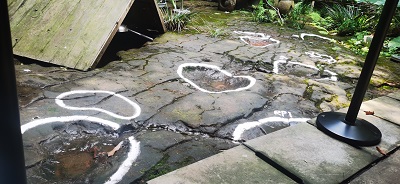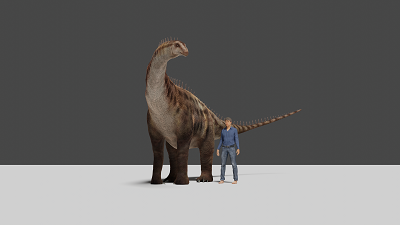
A University of Queensland researcher is part of an international team that has validated the fossilised footprints of several dinosaurs in a restaurant in China.
Dr Anthony Romilio from UQ’s Dinosaur Lab said the discovery was made last year by a curious diner.
“This person noticed around a dozen regularly spaced pits in the ground in the outdoor courtyard of the Garden Restaurant in Sichuan Province,” Dr Romilio said.
“It turns out they are the 50-60 cm long fossilised footprints of the long-necked sauropod dinosaur that lived in the Cretaceous period around 100 million years ago.
“This is a really exciting find because it shows that important dinosaur tracks can be found in unexpected places.”
The ‘pits’ were observed in the 1950s but were covered over by the then homeowner to make the ground more level.
Associate Professor Lida Xing from the China University of Geosciences (Beijing) said new owners converted the home into a restaurant about three years ago, and the pits were uncovered again.

“But still nothing was thought to be unusual,” Dr Xing said.
“That was until in mid-2022 when an observant diner pointed out that they might be something more than simply holes in the ground.
“The footprints went unnoticed for so long, but once you know what they are, it’s hard to unsee them.
“The region has no skeletal record of dinosaurs, so these fossilised tracks provide invaluable information about the types of dinosaurs that lived in the area.”
The scientists estimate the ‘restaurant dinosaurs’ to have been around 10 metres long.
“We compared the size of the footprints with complete fossil skeletons,” Dr Romilio said.
“We also know the dinosaurs were taking quite short steps for such a large animal, with a walking speed of around two kilometres per hour.”
Dr Romilio said the research highlights the importance of everyday people making valuable scientific discoveries.
“It’s a testament to the value of being curious about our surroundings and paying attention to the world around us,” he said.
“For some lucky people discoveries can come from unlikely places - even while you're having a bite to eat.”
The research is published in Cretaceous Research.
Media: Dr Anthony Romilio, a.romilio@uq.edu.au, +61 430 514 169; Associate Professor Lida Xing, xinglida@gmail.com; Faculty of Science Media, science.media@uq.edu.au, +61 438 162 687.



